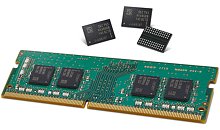The European Comission has put out yet another fine to tech companies, joining some other multi-million dollar fines that have already been dolled out. The targets of the latest fine over cartel association and price manipulation is being pointed at nine Japanese capacitor manufacturers, which were found by the European Comission to have conspired towards unduly increasing capacitor pricing between the years of 1998 and 2012.
The companies named in the investigation aren't an exact match to those that were actually fined, though. Sanyo, Hitachi, Rubycon, ELNA, Tokin, NEC, Matsuo, Nichicon, Nippon Chemi-Con, Vishay Polytech, Holy Stone Holdings, and Holy Stone Enterprises, for instance, were named. However, Tokin, Elna, Rubycon, and Hitachi each received reductions in their respective fines for cooperating with the investigation. The largest single fine, totalling €97,921,000, was given to Nippon Chemi-Con. Sanyo, however, outsmarted all its competitors - the company dodged the fine altogether for bringing the matter to the attention of the Commission in the first place. This is an interesting tactic - proceeding to take part in a cartel, extract profits, and then turn over the cartel associates to regulating bodies at the price of immunity. A part of the ruling justifying the fines can be seen after the break.




